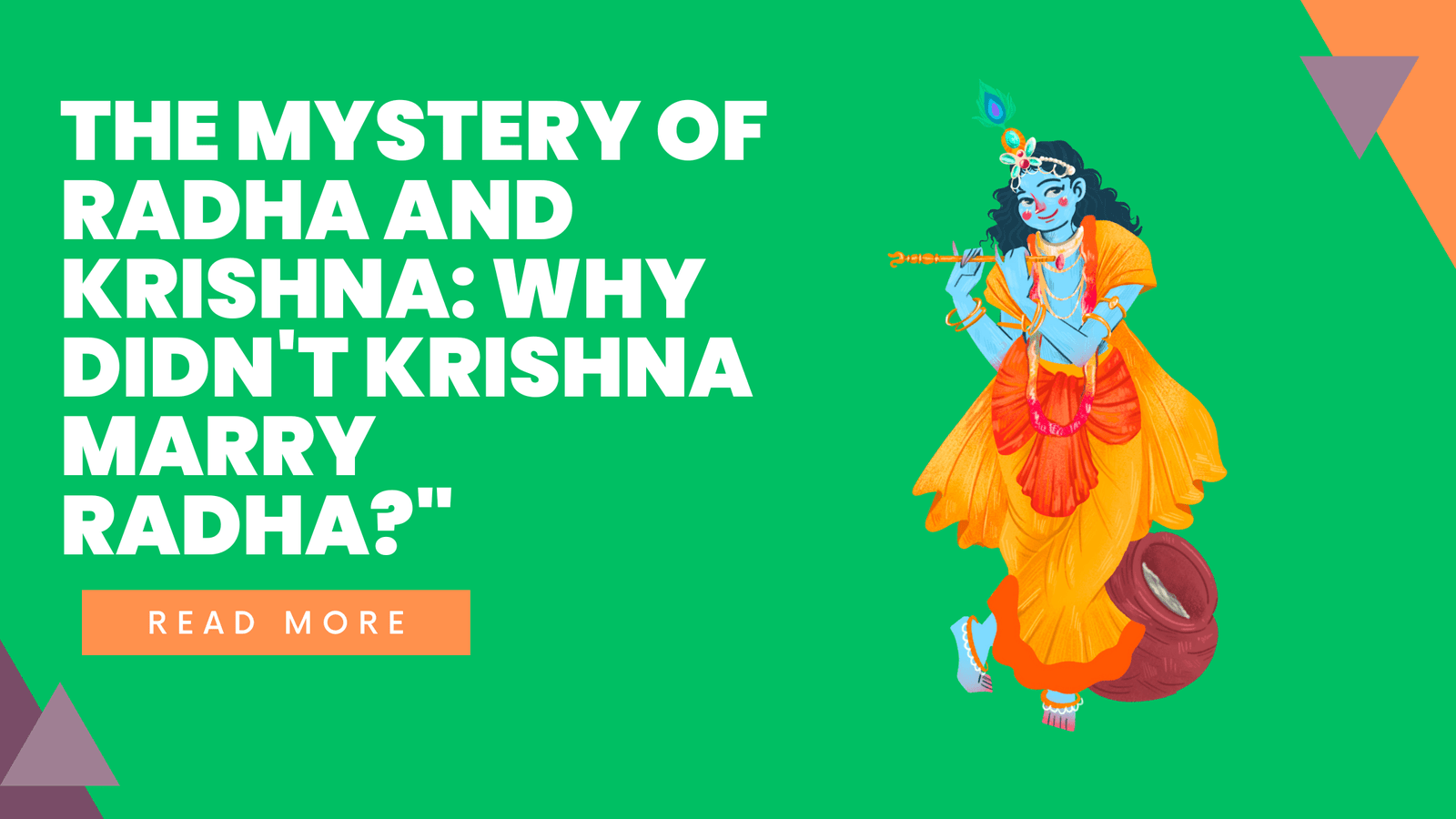“The Mystery of Radha and Krishna: Why Didn’t Krishna Marry Radha?”
The story of Radha and Krishna is one of the most enchanting and beloved tales in Indian mythology. Their divine love is celebrated in various forms across literature, music, art, and dance. Radha is often considered the supreme devotee of Krishna, a symbol of pure, unconditioned love, and their bond is seen as the epitome of devotion and spiritual connection. However, there’s one intriguing question that many people ponder: Why didn’t Krishna marry Radha?
This question has mystified devotees and scholars for centuries. Despite the deep and profound love between the two, Krishna never married Radha, and instead, he married other women, including Rukmini, Satyabhama, and others. In this blog, we will explore some of the spiritual, philosophical, and cultural reasons why Krishna didn’t marry Radha, and how their relationship transcends conventional romantic love.
1. The Divine Love Between Radha and Krishna: A Spiritual Connection
Radha’s love for Krishna is not just the love between two individuals, but a divine, spiritual union. Radha is seen as the embodiment of devotion (bhakti), and Krishna, as the supreme Lord, is the object of that devotion. Their relationship represents a transcendental love that is beyond the physical and material world.
In the Bhagavad Gita, Krishna explains that true love for him is not bound by worldly attachments, but is about surrender and pure devotion. The bond between Radha and Krishna is a reflection of this spiritual union where Radha, as the ultimate devotee, does not need the formal institution of marriage to express her love. Their love was not limited by worldly norms; it was beyond the realm of time, space, and human limitations.
2. Krishna’s Role as the Divine Teacher
Krishna’s life and actions are considered divine, and he came to earth as an incarnation of Lord Vishnu with a greater mission. His role as the teacher and guide to humanity was paramount, and the relationships he formed, including with Radha, were symbolic of higher teachings. The story of Radha and Krishna’s relationship symbolizes the eternal quest for unity with the divine and the nature of the soul’s love for God.
In this context, Krishna’s lack of marriage to Radha can be viewed as a teaching tool. It shows that the true essence of love is spiritual, not dependent on earthly constraints like marriage or possession. Krishna’s actions often demonstrate that love transcends the material world, and it is through devotion that one can attain a union with the divine.
3. Radha’s Role as the Supreme Devotee
Radha is not just a lover; she is considered the supreme devotee of Krishna. In many philosophical traditions, she represents the Atman (soul) and her love for Krishna symbolizes the soul’s yearning for union with the divine. Radha’s devotion is considered selfless and unconditional, and it is through this devotion that she attains the highest level of spiritual realization.
Krishna did not marry Radha because their love was not meant to be bound by human rituals or societal norms. Their relationship was symbolic of the unions of the soul with the divine. A marriage, which in many cultures involves worldly commitments and material bonds, could not possibly capture the pure, non-materialistic love that Radha and Krishna shared. This relationship was about love that goes beyond material existence.
4. The Concept of Divine Play: Leela
In Hindu philosophy, the concept of Leela refers to the divine play of God. Krishna’s actions on earth, including his relationships with Radha, are considered part of this divine play. The playful interactions and flirtations between Radha and Krishna, their meetings in the groves of Vrindavan, and their eternal bond are all seen as part of the divine Leela that teaches important lessons to the devotees.
Krishna, in his role as the divine lover, engages in these playful interactions not to form a conventional marriage, but to demonstrate the ideal of selfless love and devotion. By not marrying Radha, Krishna teaches that true love is not dependent on worldly expectations. Instead, it is about a deep, spiritual connection where the soul can unite with the divine in a bond that does not require material recognition.
5. The Symbolism of Radha and Krishna’s Love
Radha and Krishna’s love is a symbol of the soul’s longing for the divine. If they had married in a conventional sense, it would have implied that their love was bound by earthly limitations. But Krishna’s refusal to marry Radha shows that love, in its truest form, is free from all material conditions. Their relationship is eternal and not confined to time or space—it exists in the hearts of those who seek divine connection.
Many spiritual scholars believe that Krishna’s choice not to marry Radha is an expression of the fact that true devotion cannot be confined to a formal relationship. It is a relationship of the heart and soul, not of physical proximity or societal rituals. Through this, the love between Radha and Krishna becomes a model for devotional practices where the devotee does not need external validation but instead finds fulfillment in the internal connection with the divine.
6. The Enduring Mystique: Why the Question Persists
The question of why Krishna did not marry Radha continues to be a topic of fascination, not only for scholars and devotees but also for anyone interested in the nature of love, spirituality, and the divine. The answer is not just about a marital status; it is about understanding the nature of divine love, which cannot be fully explained by human constructs. Their love exists beyond the boundaries of time and space, and that is why it continues to resonate with people across generations.
Radha and Krishna’s relationship remains mysterious and eternal because it transcends human understanding. It is meant to remind us that love, in its highest form, is divine, and it cannot be limited by earthly limitations like marriage or possession.
Conclusion:
The love between Radha and Krishna is a timeless symbol of pure devotion and spiritual union. Krishna’s decision not to marry Radha was not a rejection, but rather a reflection of the profound nature of their love, which was not meant to be confined by earthly traditions or societal norms. Their love represents the soul’s eternal longing for the divine, transcending all material limitations.
In the end, their bond teaches us that true love is not about physical connection or rituals—it is about a spiritual connection that goes beyond the material world. The love between Radha and Krishna is eternal, ever-present, and exists in the hearts of all those who seek to experience divine devotion.
Radha and Krishna’s love is not just a myth; it is a divine truth that continues to inspire and guide millions of souls on their path to spiritual enlightenment.






